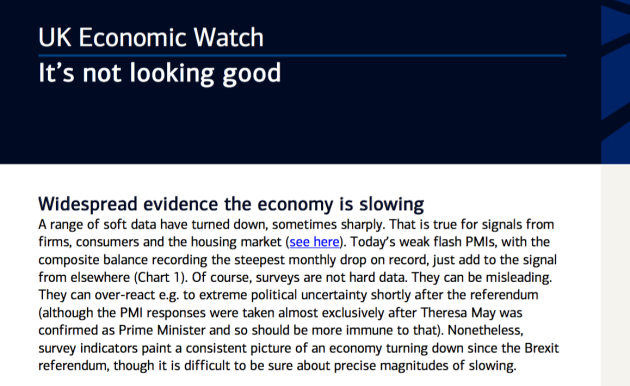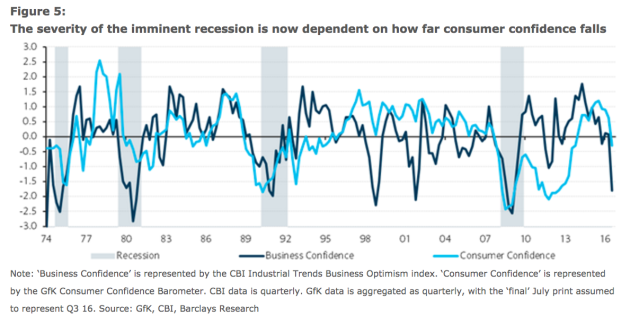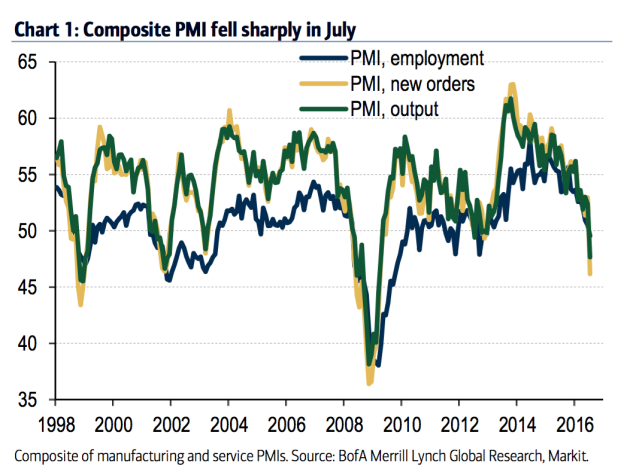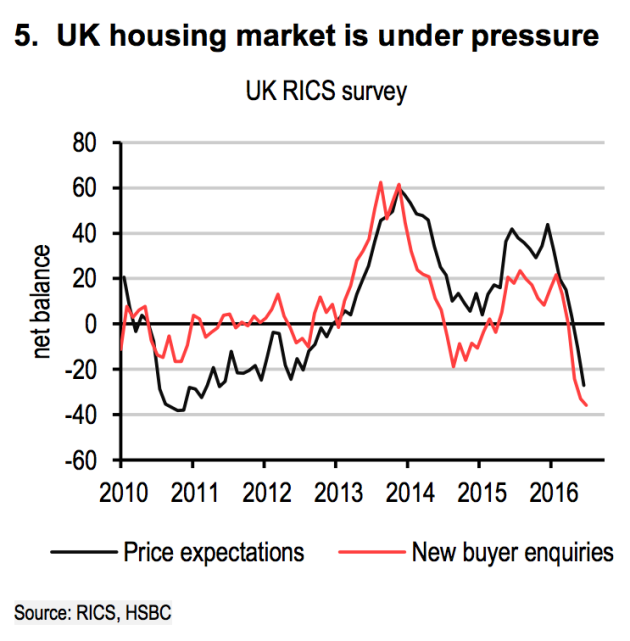By Jim Edwards | Business Insider UK Finance – Sun, Jul 31, 2016 10:52 BST

Lewis Whyld / PA Archive/Press Association Images
There has been a pronounced tone-change among UK economics analysts since the EU Referendum: They are in unanimous agreement that the UK will sink into recession in the second half of this year.
They disagree only on the details and depth.
Call it the Silence of the Bulls: No one — literally, no one — is making a bullish case for the post-Brexit economy.
That is what is so scary about this recession. Usually, analysts and economists like to hedge their bets. Their opinions are spread over a range, with outright disagreements. They talk about "the risk" of something happening; they don't say "this will happen."
 Lewis Whyld / PA Archive/Press Association Images
Lewis Whyld / PA Archive/Press Association Images
But right now everyone is saying the same thing. Bank of America Merrill Lynch's Robert Wood put out a note last week whose title says it all: "It's not looking good."
Here's another example, from HSBC's Robert Parkes and Amit Shrivastava, who cover stocks. They say that the recent spell of good news — in which the UK just notched record-high employment, at over 74%, record-low unemployment, at 4.9%, and healthy GDP growth of 2.2% in Q1 — is merely the "eye of the storm" to follow:
"Don’t believe the hope"
"Following the initial ‘shock’ from the Brexit vote, the last four weeks have been dominated by ‘hope’, in our view. ‘Hope’ surrounding the potential for further policy stimulus (both monetary and also fiscal), ‘hope’ that any economic damage from storm ‘Brexit’ will be short-lived and limited to the UK, and ‘hope’ that the political uncertainty will subside and a market-friendly outcome will be achieved. We don’t believe the ‘hope’."
"... An eerie calm has descended over European equities following the initial impact of storm ‘Brexit’ that struck in late June. Policy makers and politicians have been lining up to offer reassurance. This has helped equity market volatility to drop to below pre-referendum levels, and share prices have recovered accordingly. So the storm has now passed, correct? And therefore it is safe to assume that Brexit is no longer a relevant theme for European equities, correct? We think not. We think we are merely in the eye of the storm, and the potentially destructive ‘eyewall’ is rapidly approaching. Over the course of Q3 we see the economic headwinds intensifying and recession risk rising, not just in the UK, but also for the wider EU region."
The employment rate and GDP growth may look good, but those numbers are now in the rearview mirror. Neither of them were taken from samples prior to the Brexit vote.
By contrast, the data from after the referendum looks awful.
This chart from Barclays shows consumer confidence is heading back to where it was in the 2008 financial crisis:
 Lewis Whyld / PA Archive/Press Association Images
Lewis Whyld / PA Archive/Press Association ImagesThe drop in consumer confidence was the fastest in 27 years:
 Lewis Whyld / PA Archive/Press Association Images
Lewis Whyld / PA Archive/Press Association ImagesIt occurred because data from companies about their future plans — for creating jobs, new order, and output — tanked immediately after Brexit:
 Lewis Whyld / PA Archive/Press Association Images
Lewis Whyld / PA Archive/Press Association ImagesAnd CFOs say they don't intend to hire anyone for the next 12 months:
 Lewis Whyld / PA Archive/Press Association Images
Lewis Whyld / PA Archive/Press Association ImagesUnsurprisingly, the property market is about to grind to a halt as people cancel plans due to Brexit, and prices plummet as a result:
 Lewis Whyld / PA Archive/Press Association Images
Lewis Whyld / PA Archive/Press Association Images
OK, so maybe we're just talking ourselves into a recession? Maybe the Brexit shock will wear off? Maybe there will be a reversion to the mean? And maybe the UK will muddle through and everything will be all right?
Unlikely.
This has been a long time coming.
The fundamentals in Britain are weak and have been that way for a long time. That's why the Bank of England has kept rates at nearly zero for years. (If the economy was strong, the BOE would be jacking up rates to squash inflation.)
We told you back in March that Britain — loaded with consumer debt and light on household savings — was sleepwalking into a recession. That same month we told you that Europe, and especially the UK, was walking into the storm naked. We have no weapons to fight the recession: Central banks can't make interest rates any lower and the EU's rules require governments to maintain austerity budgets even when their governments don't want them.
The Brexit vote was the straw that broke the camel's back.
If you're a Leave voter, you're about to get exactly what you asked for.
https://uk.finance.yahoo.com/news/youre-leave-voter-youre-exactly-095200848.html